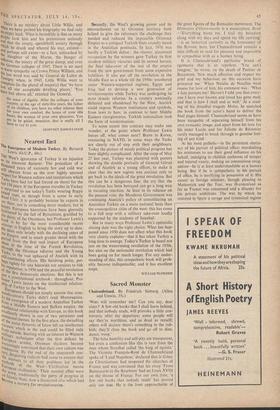Nearest East
!RE West's ignorance of Turkey is an injustice '0 its sincerest flatterer. The prejudices of a ,t11,2usand years of variously hot and cold war "'ill obscure from us the now highly unusual ;Trespee, for I Western culture and institutions which urks have had (or had forced on them) for the ;!st 150 years. If the European traveller in Turkey surprised to see today's Turks wearing floppy j,weed caps, as though from a scene in early 'end Clair, it is probably because he expects to them, not in something more modern, but in C`zes. European historians have been gloomily thaseinated by the fall of Byzantium, gratified by b",,e,,,clecaY of the Ottomans, but Professor Lewis's atte IS by far the most considerable recent1N itt : .
tnglish to bring the story up to date. the deals only briefly with the declining years of
e.Rropire, and in much greater detail with the idea from the first real impact of Europ.ean th-eas at the time of the French Revolution, lurk r°ugh the Ottoman reforms and the Young sts, to the vast upheaval of Atattirk .with its h 111-eontinuing effects. His finishing point, p.er- haes rightly for any historian not anxious to risk of renutation, is 1950 and the peaceful revolution iu,lhe first democratic elections. But this is not 'fest a constitutional textbook : throughout. P. ro- shs.s°r Lewis insists on the intellectual relation- 14) a Turkey to the West. tirroPeans should not simply assume that ni.ne- In-110,t0-eentury Turks didn't read Montesquieu. frO,„‘"e emergence of a modern Anatolian Turkey in-t"'„ a Middle Eastern and Balkan empire, the ex eueetual relationship with Europe, as this book coehe„lientlY shows, is one of two persistent and Of" m,",leeted themes. In the first place, the dwindling v; e social dynamic of Islam left an intellectual fr.:tuft which in the end could be filled only 111.1P outside. Starting with an interest in Western ,11111arY techniques after the first defeats by iner°Pcan armies, Ottoman thinkers became inarde4smgly convinced that their own culture was tur-equale. By the end of the nineteenth cen- theY, despairing radicals had conic to assume that aiethanAswers to all their problems lay in the -°`'s of the West---`Civilisation means ther°Dean i civilisation.' Their natural allies were tIi ,anhY, traditionally the party of progress in becslanlic State, now a frustrated elite which had °I.ne a nursery for revolutionaries. Secondly, the West's growing power and its encroachment on to Ottoman territory both helped to give the reformers the challenge they 'needed and reduced the impossible Ottoman Empire to a compact Turkish State soundly based in the Anatolian peninsula. In fact, 1918 was hardly a Turkish defeat : the clumsy, piecemeal occupation by the winners gave Turkey its first modern military victories and its newest heroes; the final take-over of the rest of the empire freed the new government from some expensive liabilities. It also put off the revolution in the Middle East as a whole till the 1950s; smothered under Western-supported regimes, Egypt and Iraq had to develop a new generation of revolutionaries while Turkey was undergoing its most drastic reforms. In a country nominally defeated and abandoned by the West, Atatiirk could impose Western institutions and symbols, from laws to hats; in contrast to later Middle Eastern risorgimentos, Turkish nationalism took the form of westernisation.
To some extent this contrast may make one wonder, at the point where Professor Lewis leaves off, what comes next? Brave in Korea, reassuring in NATO, in some ways the Turks are clearly out of step with their neighbours. Today the picture of steady political progress has been slightly complicated. After the coup of May 27 last year, Turkey was plastered with posters showing the double portraits of General Gtirsel and of Atattirk as a young officer, to make it clear that the new regime was anxious only to get back to the ideals of the great revolution. But this can be a dangerous line; the cry that the revolution has been betrayed can go a long way in excusing reaction. At least in its reliance on the peasant vote, the Menderes Government was continuing Atattirk's policy of consolidating an Anatolian Turkey on a more national basis than the cosmopolitan cities of the west; this has come to a full stop with a military take-over loudly supported by the students of Istanbul.
But in many ways Professor Lewis's optimistic closing date was the right choice. What has hap- pened since 1950 does not affect what this book very clearly explains—that it has taken Turkey a long time to emerge. Today's Turkey is based not just on the westernising revolution of the 1920s, but also on the nationalist revolution which had been going on for much longer. For any under- standing of this, this sympathetic book will prob- ably become indispensable; and it has excellent maps.
WILLIAM PLOWDEN


































 Previous page
Previous page